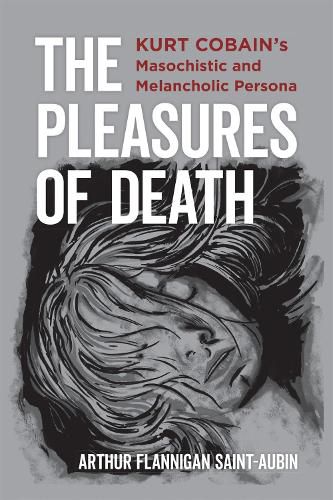Readings Newsletter
Become a Readings Member to make your shopping experience even easier.
Sign in or sign up for free!
You’re not far away from qualifying for FREE standard shipping within Australia
You’ve qualified for FREE standard shipping within Australia
The cart is loading…






This title is printed to order. This book may have been self-published. If so, we cannot guarantee the quality of the content. In the main most books will have gone through the editing process however some may not. We therefore suggest that you be aware of this before ordering this book. If in doubt check either the author or publisher’s details as we are unable to accept any returns unless they are faulty. Please contact us if you have any questions.
The year 2019 marked the twenty-fifth anniversary of the death of Kurt Cobain, an artist whose music, words, and images continue to move millions of fans worldwide. As the first academic study that provides a literary analysis of Cobain’s creative writings, Arthur Flannigan Saint-Aubin’s The Pleasures of Death: Kurt Cobain’s Masochistic and Melancholic Persona approaches the journals and songs crafted by Nirvana’s iconic front man from the perspective of cultural theory and psychoanalytic aesthetics.
Drawing on critiques and reformulations of psychoanalytic theory by feminist, queer, and antiracist scholars, Saint-Aubin considers the literary means by which Cobain creates the persona of a young, white, heterosexual man who expresses masochistic and melancholic behaviors. On the one hand, this individual welcomes pain and humiliation as atonement for unpardonable sins; on the other, he experiences a profound sense of loss and grief, seeking death as the ultimate act of pleasure. The first-person narrators and characters that populate Cobain’s texts underscore the political and aesthetic repercussions of his art. Cobain’s distinctive version of grunge, understood as a subculture, a literary genre, and a cultural practice, represents a specific performance of race and gender, one that facilitates an understanding of the self as part of a larger social order.
Saint-Aubin approaches Cobain’s writings independently of the artist’s biography, positioning these texts within the tradition of postmodern representations of masculinity in twentieth-century American fiction, while also suggesting connections to European Romantic traditions from the nineteenth century that postulate a relation between melancholy (or depression) and creativity. In turn, through Saint-Aubin’s elegant analysis, Cobain’s creative writings illuminate contradictions and inconsistencies within psychoanalytic theory itself concerning the intersection of masculinity, masochism, melancholy, and the death drive.
By foregrounding Cobain’s ability to challenge coextensive links between gender, sexuality, and race, The Pleasures of Death reveals how the cultural politics and aesthetics of this tragic icon’s works align with feminist strategies, invite queer readings, and perform antiracist critiques of American culture.
$9.00 standard shipping within Australia
FREE standard shipping within Australia for orders over $100.00
Express & International shipping calculated at checkout
This title is printed to order. This book may have been self-published. If so, we cannot guarantee the quality of the content. In the main most books will have gone through the editing process however some may not. We therefore suggest that you be aware of this before ordering this book. If in doubt check either the author or publisher’s details as we are unable to accept any returns unless they are faulty. Please contact us if you have any questions.
The year 2019 marked the twenty-fifth anniversary of the death of Kurt Cobain, an artist whose music, words, and images continue to move millions of fans worldwide. As the first academic study that provides a literary analysis of Cobain’s creative writings, Arthur Flannigan Saint-Aubin’s The Pleasures of Death: Kurt Cobain’s Masochistic and Melancholic Persona approaches the journals and songs crafted by Nirvana’s iconic front man from the perspective of cultural theory and psychoanalytic aesthetics.
Drawing on critiques and reformulations of psychoanalytic theory by feminist, queer, and antiracist scholars, Saint-Aubin considers the literary means by which Cobain creates the persona of a young, white, heterosexual man who expresses masochistic and melancholic behaviors. On the one hand, this individual welcomes pain and humiliation as atonement for unpardonable sins; on the other, he experiences a profound sense of loss and grief, seeking death as the ultimate act of pleasure. The first-person narrators and characters that populate Cobain’s texts underscore the political and aesthetic repercussions of his art. Cobain’s distinctive version of grunge, understood as a subculture, a literary genre, and a cultural practice, represents a specific performance of race and gender, one that facilitates an understanding of the self as part of a larger social order.
Saint-Aubin approaches Cobain’s writings independently of the artist’s biography, positioning these texts within the tradition of postmodern representations of masculinity in twentieth-century American fiction, while also suggesting connections to European Romantic traditions from the nineteenth century that postulate a relation between melancholy (or depression) and creativity. In turn, through Saint-Aubin’s elegant analysis, Cobain’s creative writings illuminate contradictions and inconsistencies within psychoanalytic theory itself concerning the intersection of masculinity, masochism, melancholy, and the death drive.
By foregrounding Cobain’s ability to challenge coextensive links between gender, sexuality, and race, The Pleasures of Death reveals how the cultural politics and aesthetics of this tragic icon’s works align with feminist strategies, invite queer readings, and perform antiracist critiques of American culture.